“George. FLOYD! George. FLOYD!”
“BLACK LIVES MATTER! BLACK LIVES MATTER!”
“NO JUSTICE, NO PEACE! NO JUSTICE, NO PEACE!”
With signs in their hands, masks on their faces, and passion in their voices, Ridgewood and Bergen County residents collectively made a statement last Wednesday, June 10. A crowd of approximately 2000 people marched across town to the Ridgewood YMCA, where everyone stood, socially distanced, yet together in their support of a common theme: Black lives matter. This event in Ridgewood joins a list of hundreds, if not thousands of protests, rallies, and vigils across our nation and across the world expressing outrage at the murders of countless people of color at the hands of police. Although Ridgewood is a village, its passion was put on display with loud chants, effervescent speakers, in-school efforts, and a sense of unity in the face of hatred and discrimination. Our town is not just a part of Bergen County; our town is not just a New York City suburb; our town is a part of a national conversation on racial prejudice and violence, and partly because we too must reckon with a racist history.
On Memorial Day, 46-year old George Floyd was suffocated under the knee of 44-year old Minneapolis police officer Derek Chauvin. Chauvin and three other Minneapolis officers placed Floyd under arrest with the suspicion that Floyd had attempted to use a counterfeit $20 check. Chauvin kneeled on Floyd’s throat for 8 minutes and 46 seconds, which was captured on video by passersby in Minneapolis. These videos were widely circulated and gained instant virality. Seeing a white police officer egregiously murder Floyd—yet another Black man in an extensive list of police brutality victims across the country—subsequently set in motion a wave of civil rights protests across the globe, the likes of which have not been seen for decades. The scale of these protests can be attributed to outrage over what seems to be centuries without progress, a feeling of loss and hopelessness in the middle of a pandemic, and the lack of outside responsibilities as everyone sits distanced in their homes itching for some kind of action. Protests in many cities have turned violent, raising the questions of how police and the National Guard should respond, and what the responsibility of Washington is in mitigating national unrest.
Ridgewood residents have immediately called for justice and an end to racism with biting passion. On June 3, a rally was held at the intersection of Maple Ave and Linwood Ave, where residents gathered with signs and speakers called for change. Additional plans for rallies, protests, and marches in the greater Bergen County area instantly began to formulate that same week. In Ridgewood, the MLK Committee as well as the Community Peace and Justice Forum worked to organize an “Evening of Solidarity,” on June 10, which started with a 3:30 PM march from the train station to the Ridgewood YMCA parking lot. Ridgewood High School students marched alongside one another, their fellow citizens, and their elected and public officials, chanting, demonstrating, and showing solidarity. Ridgewood Police shut down roads in town and escorted the marchers. Police officers marched alongside protestors, including Ridgewood Police Chief Jacqueline Luthcke.
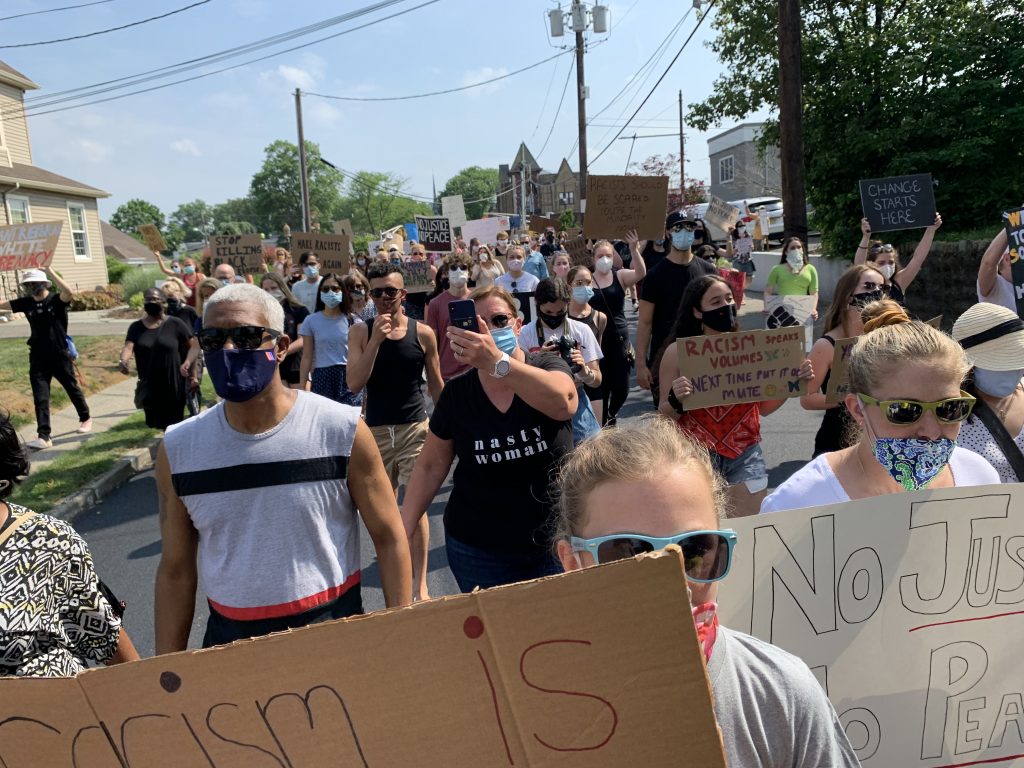
Atoya Burleson leading chants.
At the YMCA, the crowd gathered, socially distanced and predominantly wearing masks to participate in a rally. Once everyone had trickled in music that had been pumping out of speakers flanking a wooden platform with a podium brought out from the YMCA stopped, and Reverend Lemuel Brown of Ridgewood’s Mount Bethel Baptist Church stepped up onto the stage, grabbing the mic and bellowing into the afternoon, late spring air: “NO JUSTICE—”
The crowd responded: “NO PEACE!”
“NO JUSTICE—”
“NO PEACE!”
“WHAT DO WE WANT?”
“JUSTICE”
“WHEN DO WE WANT IT?”
“NOW”
Brown continued, launching into an introduction to the event and establishing the tone of the rest of the afternoon: that the Black population must no longer be victims to the specter of white violence, that complacency from the general public must be ceased, that public education on race, diversity, and our country’s tainted history is paramount, and that the United States of America must be changed. Brown hosted the event in its entirety, introducing various guest speakers and then getting up to speak and lead brief chants in between each one to offer continuing remarks.
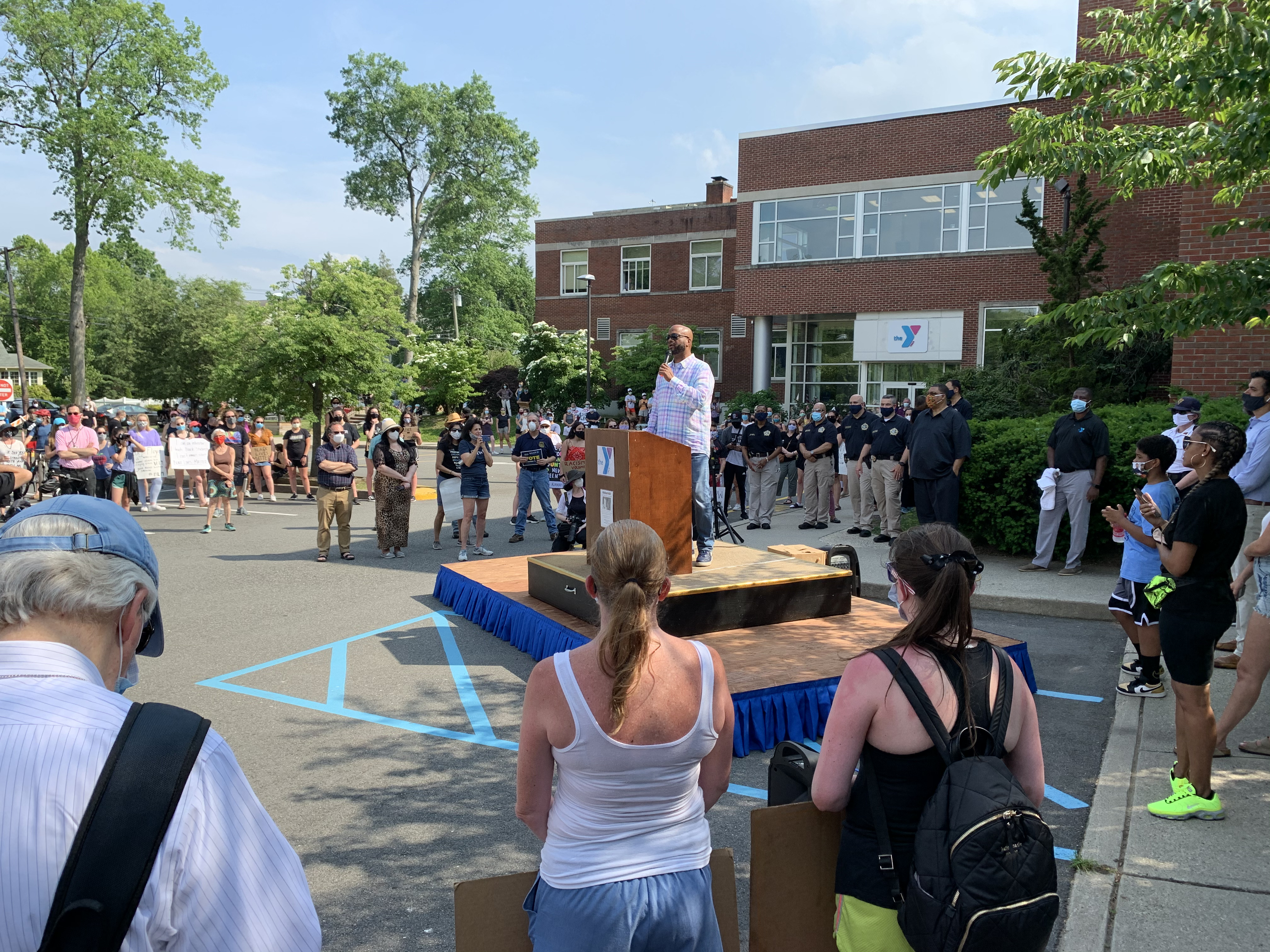
A long list of speakers, all from different backgrounds and professions but all tied to either the Ridgewood, Bergen County, or New Jersey community, had the chance to offer their perspective.
New Jersey Attorney General Gurbir Grewal stressed that New Jersey must be a frontrunner with policing reform, erasing systemic racism, and bringing justice to African-Americans “to make sure that [New Jersey] can be a model for the rest of the country” and to truly make Black lives matter.
Grewal finishes his remarks, Brown and RHS junior Laurence Fine lead chants.
Atoya Burleson, Ridgewood resident, shared a story of police officers beating her father (who, Atoya describes, was entirely compliant with the officers’ instructions) decades ago during a nighttime traffic stop, hospitalizing him with a dislodged eye socket and mangled, bloodied face.
Atoya Burleson shares the story of her father.
Ridgewood YMCA CEO Ernest Lamour related how he, as the first-ever black CEO of the Ridgewood Y, was the target of incredibly derogatory racial slurs directed at him in the workplace. He spoke out that “Black Lives Matter gives a face and a voice to those who have been marginalized and pushed to the edge… [it] does not seek to take away from one to give to another as it is the very definition of the racism we so desperately want and need to eradicate.”
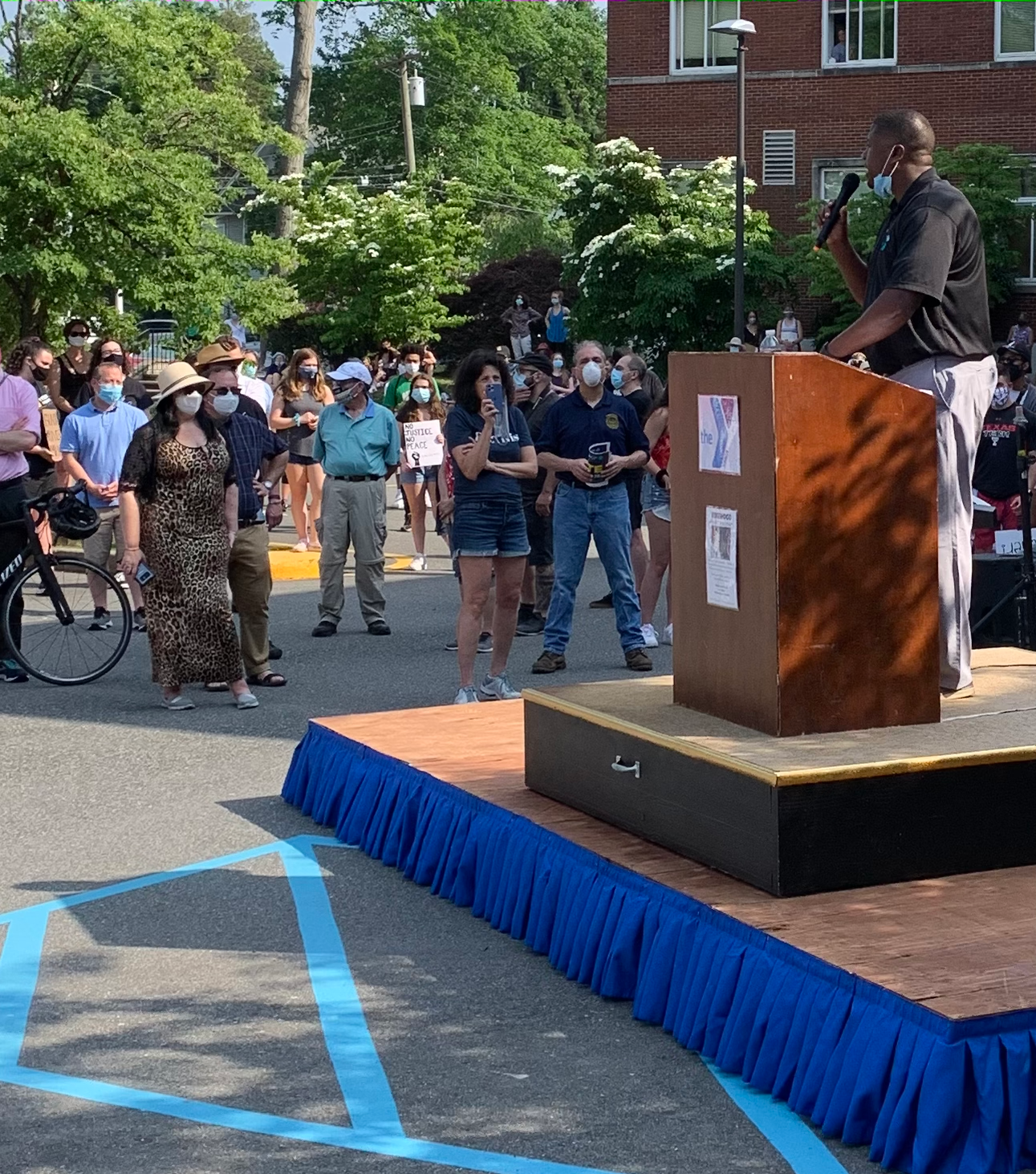
Jacqueline Luthke, Ridgewood Police Chief, addressed that the Ridgewood police force does not tolerate any bias, any prejudice, directed towards any group, and that the inclusivity of this community and the role of the police as protectors and helpers of the public is of utmost importance.
Bergen County Sheriff Anthony Cureton echoed similar sentiments, highlighting the fact that racism in Bergen County and New Jersey is much closer than many would think in their seemingly perfect ideal bubble. He, alongside Grewal, is on the forefront of tackling prejudice and violence within NJ police forces wherever they may arise.
Nate Burleson, husband of Atoya Burleson and former NFL player, emphasized the idea that police brutality and racial violence is deep-seeded; that the list of Black victims’ names is unfortunately incredibly extensive and vast—and that it is the responsibility of everyone to remember those whose lives are lost and it is the responsibility of everyone to no longer be complacent. Mr. Burleson then invited the crowd to participate in a 8 minute and 46 second moment of silence—the crowd kneeled and lay face-down, signs and fists held firmly in the air, heads bowed.
Nate Burleson gives his remarks.
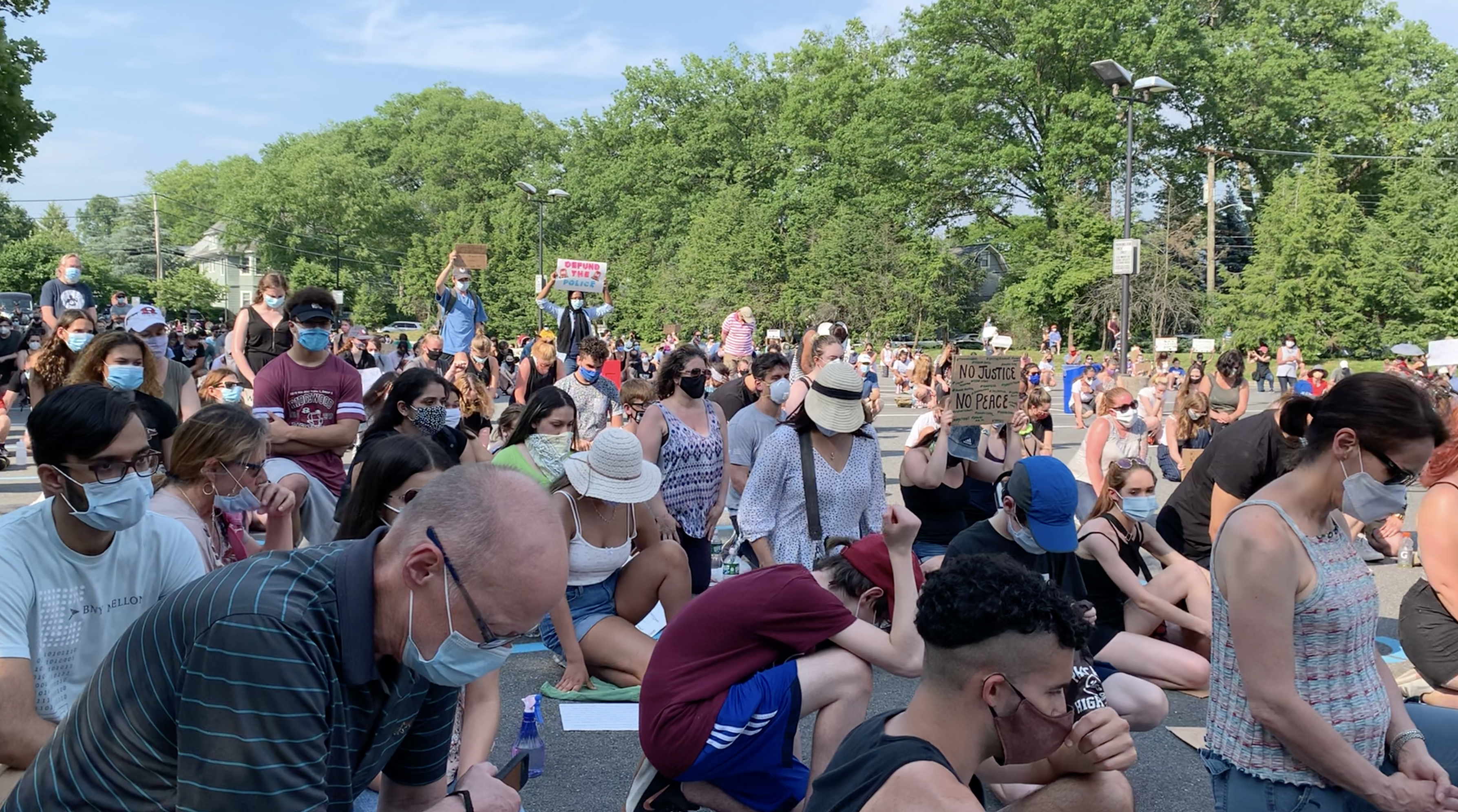
Following the moment of silence, Mr. Burleson left the audience with statements that emphasized the notion that collaboration and acceptance is the first step in reaching everyone’s goals to transform the United States into a greater, more just society: “the human race has no finish line. We might as well run it together.”
The rally concluded with a live, heartful performance of Bill Withers’s “Lean on Me” and with Brown’s dismissal, the crowd mingled and dispersed, young people, old people, men, women, people of all different backgrounds leaving the parking lot of the Ridgewood YMCA after actively demanding change to their country and community. Efforts in Ridgewood are not stopping with demonstrations like this, however.
“Lean on Me” performed with the crowd.
Ridgewood High School has been very transparent about the school’s civil rights curriculum. In an email sent by Principal Dr. Thomas A. Gorman on June 10, he cited the various presentations in our speaker series, programs, as well as lessons and activities in the classroom that promote a broad understanding of civil rights for RHS students. However, some parents and students have expressed disappointment in this curriculum, stating that it is ineffective in teaching about civil rights and the troubled past of our nation.
One significant highlight of how the RHS community has dedicated itself to difficult discussions about race is the annual Segregation Symposium, hosted by Mr. Charlie Appel as well as other RHS Social Studies teachers. Each year, students from RHS meet with students from other schools in the area and discuss topics relating to how racial and ethnic segregation is present in our area today. Ridgewood High School’s participation in the Segregation Symposium as well as the in-class Civil Rights Gallery Walk project have led to a reckoning and deeper understanding among students of Ridgewood’s own history as an affluent, exclusive, and racially discriminatory community. In the 20th century, redlining played a significant role in districting the village and in creating racially separated neighborhoods. Today, the population of Ridgewood is approximately 73% white and 1.5% black according to census data. The symposium and gallery walk, both in the school community, have exposed to students the fact that discrimination and racial privilege are much closer to home than many would ever think.
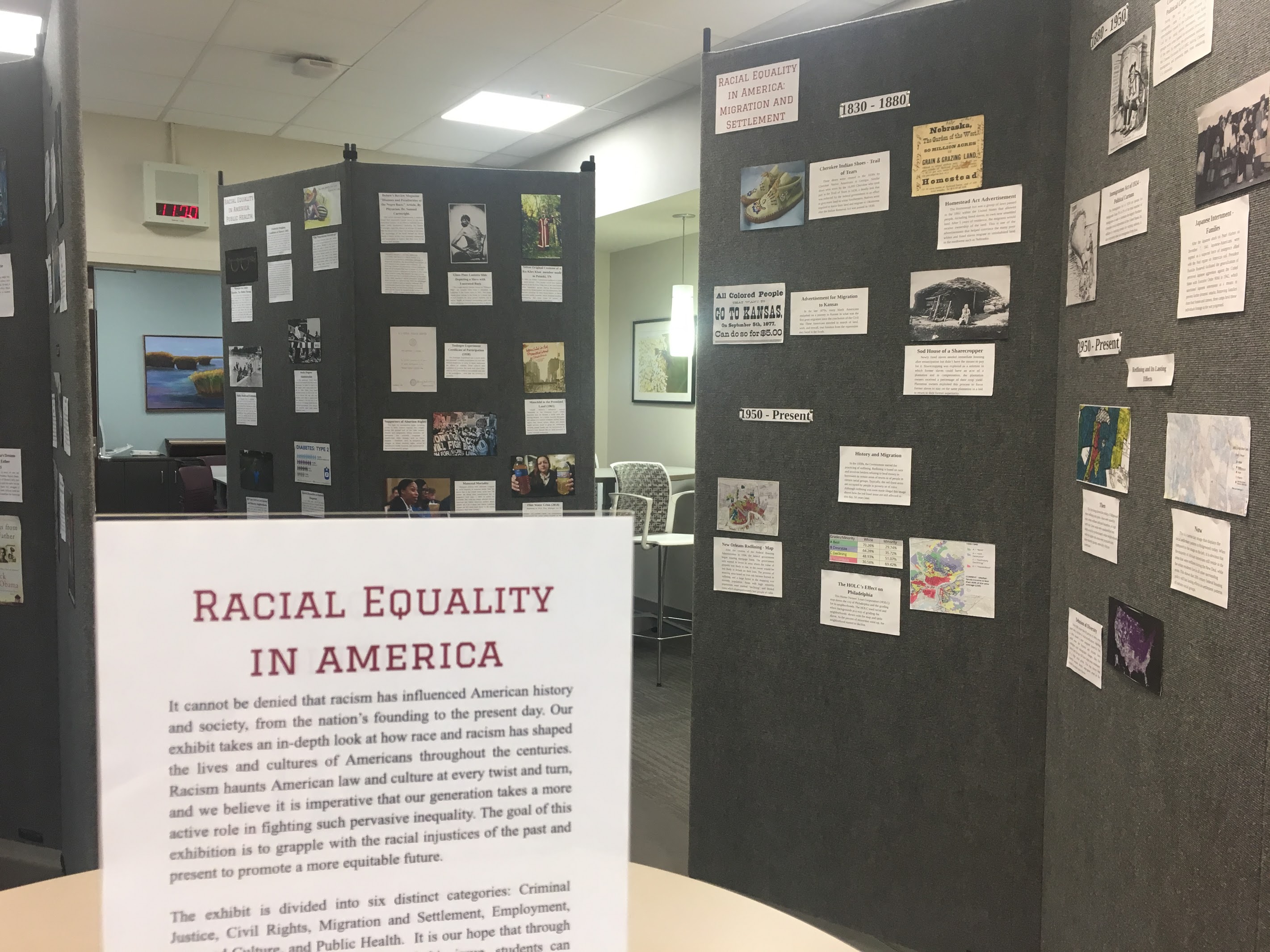
Appel as well as other RHS Social Studies teachers Medha Kirtane, Freddie LaFemina, Dan Muro, and Mike Troy have created a new series of discussions: the George Floyd Forum. The first of which was hosted on Zoom on Friday, June 5, by RHS Social Studies teachers; it was a panel-style format featuring guest panelists Johanna Garcia – lifelong community activist addressing the education, housing and health care needs of Upper Manhattan; Michael Tiffany – Retired Assistant Chief of NYPD Intelligence Division; and Torre Watson – teacher, coach, and mentor in Ridgewood for the last 24 years. After the panel discussion, students and teachers were mixed together in breakout rooms to discuss, and there was a follow-up session the next Friday in a more intimate format, with small breakout rooms full of students and teachers who wanted to continue the conversation.
These discussions have opened up a dialogue about race within our community, and not being in school has not stopped these conversations from occurring. These recent initiatives have sparked calls for continued discussion over the summer and into the 2020-2021 school year, and talks of developing a committee or club at RHS that will make sure this discussion continues have been circulating. Mr. Appel, the head organizer of the Floyd Forum, has stressed the importance of not only talking about racial injustice during February, (Black History Month) or only after murders based on race are publicized by the media. These are not isolated discussions for when racism and violence in America is popular or trendy to talk about; the RHS community has emphasized how this should be one discussion—one uninterrupted by feelings of complacency or desires to “move on” to something else.
Changing the conversation in the classroom to advertise ways for students to get involved with various organizations and teachers having open discussions with their students about implicit bias and implicit bias training were also discussed at the Floyd Forum. The landscape of race education and civil rights activism in the classrooms of RHS is shifting significantly, which is one of the goals of the Social Studies department through all of this. The discussion on George Floyd, police brutality of all forms, and the broader context of inextricable racism in America is one that both teachers and students want to be continuous and energized into next year and beyond to educate, disintegrate the privileged community bubble, and empower students to make positive change, combatting racism and prejudice in the world through real-life connections.
RHS junior Laurence Fine, who helped plan Ridgewood’s “Evening of Solidarity,” avows that “police brutality and racism aren’t over. They didn’t end after the march, they are not going to end tomorrow, and they are not going to end on Election Day. The Ridgewood march was just the beginning. We need to keep up the momentum—this is a movement, not a moment.”
Luca Richman and Logan Richman
Digital Content and Social Media Editors
Photography and Video: Luca and Logan Richman

